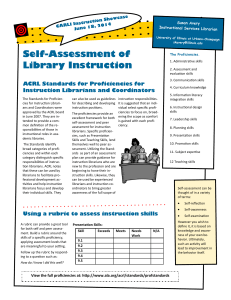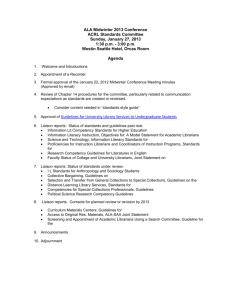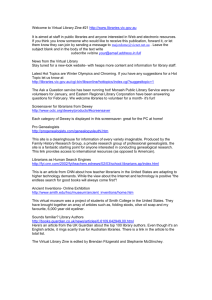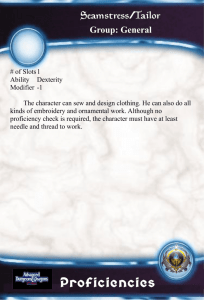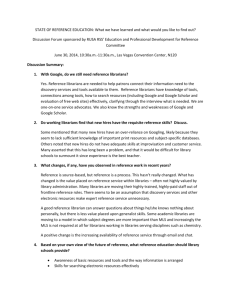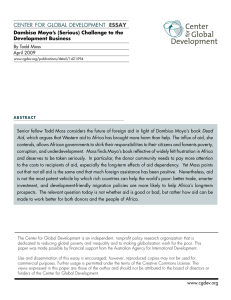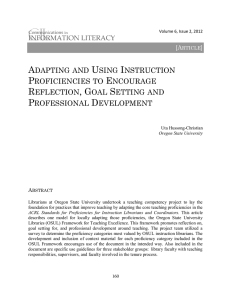Poster - VTechWorks
advertisement
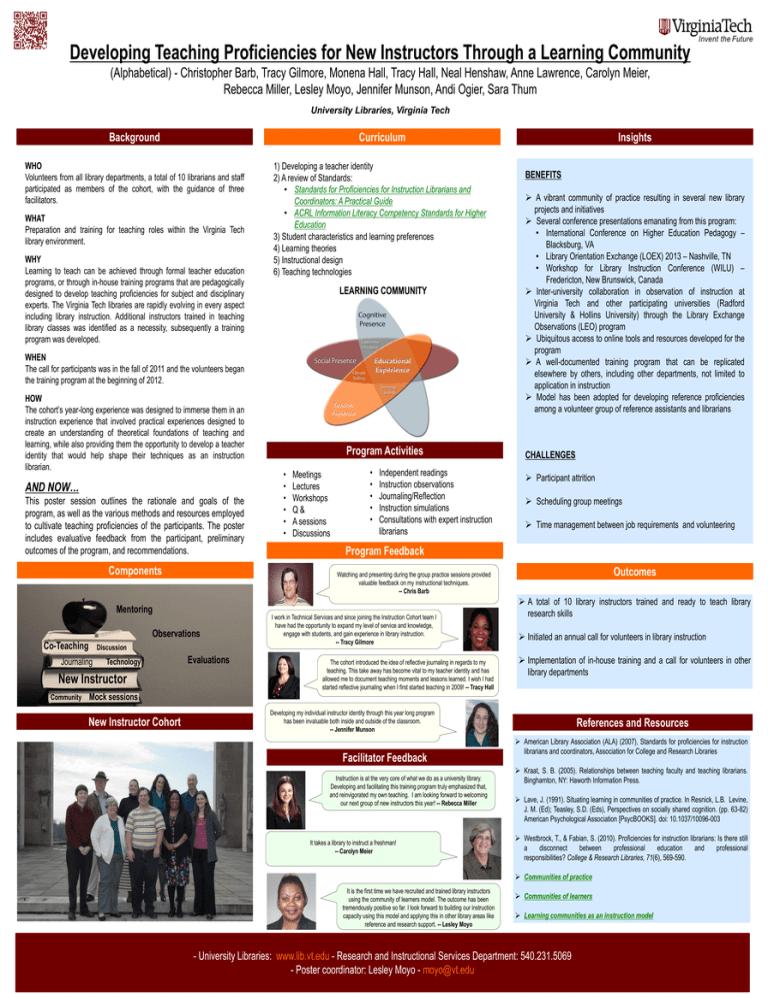
Developing Teaching Proficiencies for New Instructors Through a Learning Community (Alphabetical) - Christopher Barb, Tracy Gilmore, Monena Hall, Tracy Hall, Neal Henshaw, Anne Lawrence, Carolyn Meier, Rebecca Miller, Lesley Moyo, Jennifer Munson, Andi Ogier, Sara Thum University Libraries, Virginia Tech Background Curriculum WHO Volunteers from all library departments, a total of 10 librarians and staff participated as members of the cohort, with the guidance of three facilitators. 1) Developing a teacher identity 2) A review of Standards: • Standards for Proficiencies for Instruction Librarians and Coordinators: A Practical Guide • ACRL Information Literacy Competency Standards for Higher Education 3) Student characteristics and learning preferences 4) Learning theories 5) Instructional design 6) Teaching technologies WHAT Preparation and training for teaching roles within the Virginia Tech library environment. WHY Learning to teach can be achieved through formal teacher education programs, or through in-house training programs that are pedagogically designed to develop teaching proficiencies for subject and disciplinary experts. The Virginia Tech libraries are rapidly evolving in every aspect including library instruction. Additional instructors trained in teaching library classes was identified as a necessity, subsequently a training program was developed. LEARNING COMMUNITY WHEN The call for participants was in the fall of 2011 and the volunteers began the training program at the beginning of 2012. HOW The cohort’s year-long experience was designed to immerse them in an instruction experience that involved practical experiences designed to create an understanding of theoretical foundations of teaching and learning, while also providing them the opportunity to develop a teacher identity that would help shape their techniques as an instruction librarian. AND NOW… This poster session outlines the rationale and goals of the program, as well as the various methods and resources employed to cultivate teaching proficiencies of the participants. The poster includes evaluative feedback from the participant, preliminary outcomes of the program, and recommendations. Components Observations Discussion Journaling Technology New Instructor Community • • • • • • Meetings Lectures Workshops Q& A sessions Discussions • • • • • Independent readings Instruction observations Journaling/Reflection Instruction simulations Consultations with expert instruction librarians BENEFITS A vibrant community of practice resulting in several new library projects and initiatives Several conference presentations emanating from this program: • International Conference on Higher Education Pedagogy – Blacksburg, VA • Library Orientation Exchange (LOEX) 2013 – Nashville, TN • Workshop for Library Instruction Conference (WILU) – Fredericton, New Brunswick, Canada Inter-university collaboration in observation of instruction at Virginia Tech and other participating universities (Radford University & Hollins University) through the Library Exchange Observations (LEO) program Ubiquitous access to online tools and resources developed for the program A well-documented training program that can be replicated elsewhere by others, including other departments, not limited to application in instruction Model has been adopted for developing reference proficiencies among a volunteer group of reference assistants and librarians CHALLENGES Participant attrition Scheduling group meetings Time management between job requirements and volunteering Program Feedback Outcomes Watching and presenting during the group practice sessions provided valuable feedback on my instructional techniques. -- Chris Barb Mentoring Co-Teaching Program Activities Insights Evaluations I work in Technical Services and since joining the Instruction Cohort team I have had the opportunity to expand my level of service and knowledge, engage with students, and gain experience in library instruction. -- Tracy Gilmore The cohort introduced the idea of reflective journaling in regards to my teaching. This take away has become vital to my teacher identity and has allowed me to document teaching moments and lessons learned. I wish I had started reflective journaling when I first started teaching in 2009! -- Tracy Hall A total of 10 library instructors trained and ready to teach library research skills Initiated an annual call for volunteers in library instruction Implementation of in-house training and a call for volunteers in other library departments Mock sessions New Instructor Cohort Developing my individual instructor identity through this year long program has been invaluable both inside and outside of the classroom. -- Jennifer Munson Facilitator Feedback Instruction is at the very core of what we do as a university library. Developing and facilitating this training program truly emphasized that, and reinvigorated my own teaching. I am looking forward to welcoming our next group of new instructors this year! -- Rebecca Miller It takes a library to instruct a freshman! -- Carolyn Meier References and Resources American Library Association (ALA) (2007), Standards for proficiencies for instruction librarians and coordinators, Association for College and Research Libraries Kraat, S. B. (2005). Relationships between teaching faculty and teaching librarians. Binghamton, NY: Haworth Information Press. Lave, J. (1991). Situating learning in communities of practice. In Resnick, L.B. Levine, J. M. (Ed); Teasley, S.D. (Eds), Perspectives on socially shared cognition. (pp. 63-82) American Psychological Association [PsycBOOKS]. doi: 10.1037/10096-003 Westbrock, T., & Fabian, S. (2010). Proficiencies for instruction librarians: Is there still a disconnect between professional education and professional responsibilities? College & Research Libraries, 71(6), 569-590. Communities of practice It is the first time we have recruited and trained library instructors using the community of learners model. The outcome has been tremendously positive so far. I look forward to building our instruction capacity using this model and applying this in other library areas like reference and research support. -- Lesley Moyo Communities of learners Learning communities as an instruction model - University Libraries: www.lib.vt.edu - Research and Instructional Services Department: 540.231.5069 - Poster coordinator: Lesley Moyo - moyo@vt.edu
